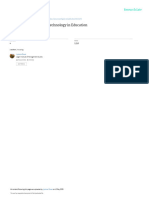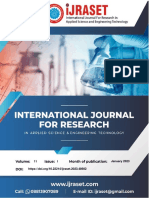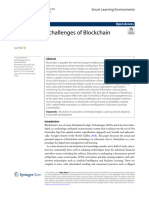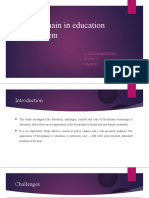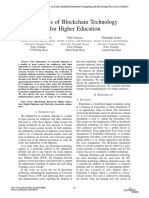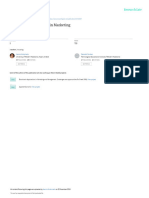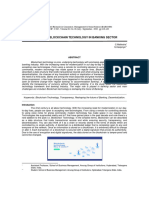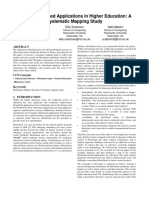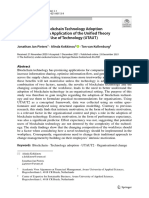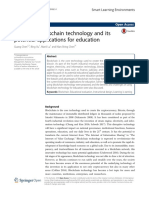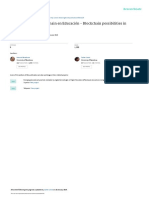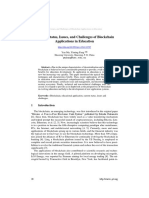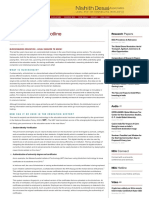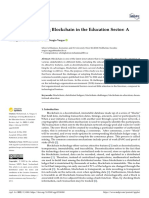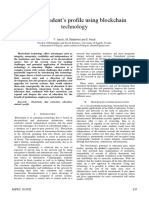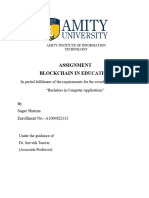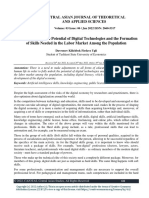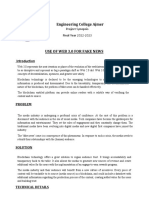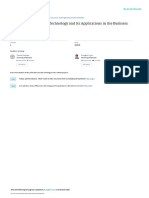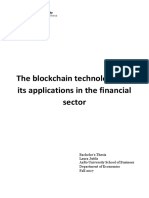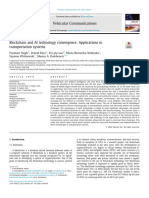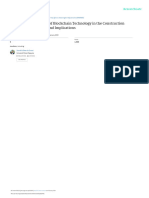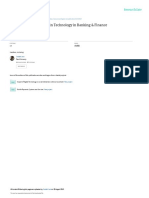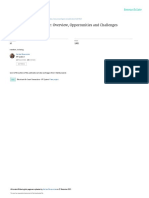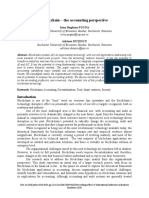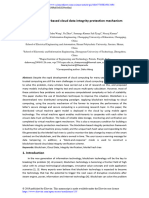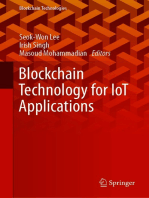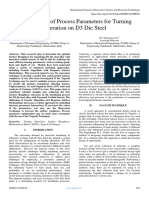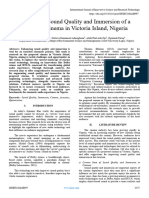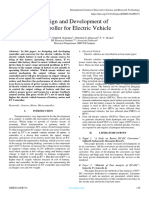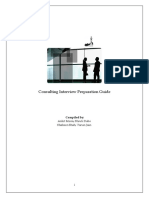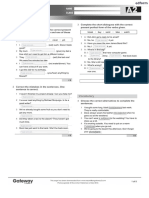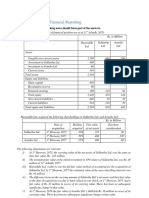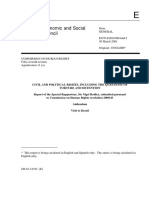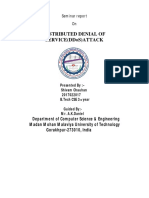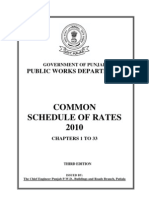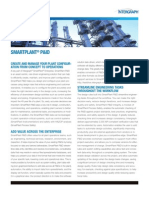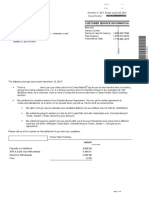Professional Documents
Culture Documents
Some Aspects of Economy Digital Transformation - Benefits, Challenges and Prospects of Implementing Blockchain Technology in Education System
Copyright
Available Formats
Share this document
Did you find this document useful?
Is this content inappropriate?
Report this DocumentCopyright:
Available Formats
Some Aspects of Economy Digital Transformation - Benefits, Challenges and Prospects of Implementing Blockchain Technology in Education System
Copyright:
Available Formats
Volume 6, Issue 9, September – 2021 International Journal of Innovative Science and Research Technology
ISSN No:-2456-2165
Some Aspects of Economy Digital Transformation -
Benefits, Challenges and Prospects of Implementing
Blockchain Technology in Education System
Maia Noniashvili Tamta Batmanashvili
Business and Technology University, Georgia Business and Technology University, Georgia
Abstract:- Initially Blockchain was discussed by the The aim of the paper is, on the one hand, to analyse the
masses as a fundamental technology of cryptocurrency. benefits and prospects of the introduction of blockchain, and
Today, it is considered as an opportunity to keep on the other hand, to study the use of blockchain as a way to
information steadily, which can be used in erstwhile simplify processes, reduce time costs and financially
unexplored industries and it can have an incredibly huge optimize. In this regard, it focuses on three main issues (1)
effect on the industries’ development. In the research it educational institutions developed with blockchain
is discussed the opportunities and challenges of using technology, (2) the benefits that blockchain technology can
blockchain technologies in the education sector. On one bring to education, and (3) the challenges of its adoption.
hand, the main goal of the research is, to analyse the
benefits and point of view of blockchain’s establishment In this regard, the paper addresses two important
(introduction), and on the other hand, to study the use of questions:
blockchain as an action to simplify processes, and make – First, how can blockchain technology improve the
them efficient. The research was conducted in the performance, processes, and financial conditions of the
Republic of Georgia, in three different directions: a education system to stakeholders? This question will
students’ survey, an employers’ survey and a survey and analyse three different segments that can benefit from
analysis of the opinions of representatives of higher decisions made using blockchain: 1) Educational
educational institutions. As a result of the research, three organizations (e.g. universities, start-up organizations)
different segments, that could get a benefit from looking for ways to increase student data storage and
decisions made by using blockchain, have been analysed. management efficiency and security; 2) Students who
can access more attractive, reliable and sustainable ways
Keywords:- Blockchain, Blockchain Technology, Edtech, of accumulating, certifying and sharing knowledge; 3)
Digitization, Education. Employers looking for reliable, safe methods to assess
the authenticity of students' skills and certifications. This
I. INTRODUCTION paper will discuss the incentives, reasons for restraint,
and general goals of these three parties. We will analyse
Recently, blockchain technology has attracted blockchain as a solution that can create both individual
considerable attention from researchers and practitioners. and collective significance through educational
This is mainly due to its unique features including programs.
decentralization, security, reliability and data integrity. – Second - What are the obstacles to the implementation of
Despite this growing interest, little is known in terms of the blockchain in the education sector? This question
knowledge about the application of blockchain technology will focus on identifying and analysing problems that
in practice. (Agbo, 2019) may arise for both private and public education
organizations that aim to develop or implement
This paper discusses the opportunities and challenges blockchain solutions.
of using blockchain technologies in the education sector:
digitalization of diplomas and various types of educational II. LITERATURE REVIEW
certificates, decentralization and lifelong learning and
motivation. Some of the challenges explored, are the basic Blockchain is an emerging technology that was
data protection laws that hinder programmers; As well as the introduced in 2008. It was first used to record transactions
large-scale challenges posed by slow-moving blockchain using Bitcoin. (Allamary, et.al 2019 p.13).
transactions. In addition, market readiness for innovation
and challenge underscores the fact that blockchain in As mentioned in many papers, a blockchain is an
education is a relatively immature innovation that is often unchanged, decentralized database, a kind of chain of
overlooked or perceived by educational institutions’ top “blocks” that stores information such as dates, times, costs,
management. (Alammary et.al 2019). participants, and etc. Mainly three types of blockchains are
distinguished: public, private and permitted. (Zheng 2017 p.
559).
IJISRT21SEP210 www.ijisrt.com 249
Volume 6, Issue 9, September – 2021 International Journal of Innovative Science and Research Technology
ISSN No:-2456-2165
Blockchain by its very nature revolutionizes and as well. Its use seems risky, especially when most of the
creates the world without intermediaries. It connects the two operations performed using it are of a pilot nature. Piloting
poles of the universe - the transmitter and the receiver and new technology raises high expectations, and at the
without an intermediary and without additional interference. same time raises many questions how it should be used in
A new circle is created, where the number of participants is education. (Bartlome et.al 2017).
reduced to a minimum, the so-called Horizontal world.
(Bartlome et.al 2017). The influence of blockchain in other Observing EU blockchain imitative map one will find,
areas beyond the cryptocurrency is growing day by day. that most of the blockchain initiatives are concentrated in
And this technology has found its development in education EU (pic-1) – Source: EU Blockchain initiative map
Picture N1 – Block chain Initiatives Worldwide
But if we separate blockchain initiatives in education (pic – 2), we see reduced numbers, and if we filter the results by “pilot
completed with real results”, we can easily count them on the map, due to its small number (pic-3).
Picture N2 -Block Chain Initiatives in Education in EU
IJISRT21SEP210 www.ijisrt.com 250
Volume 6, Issue 9, September – 2021 International Journal of Innovative Science and Research Technology
ISSN No:-2456-2165
Picture N3 – Completed Block Chain Pilots in EU
The use of blockchain in education is still in its Nowadays, there are many programs created using
infancy. Only a small number of educational institutions blockchain. It is interesting how they are realized for
have started using blockchain technology. Most of these educational purposes, since it is a new word in the
institutions are in different fields. This technology is used to continuous progress of the educational system. These
verify and share academic certificates (diplomas, programs can be classified into twelve categories
certificates, etc.), as well as to digitize the results that their (Alammary 2019):
students have achieved. However, field researchers believe – Certificate Management
that blockchain technology has far more potential to – Competencies and Learning Outcomes Management
revolutionize the field. Blockchain can reduce the central – Assess students' professional skills
role of educational institutions as a certification agent and – Protection of study subjects
provide more opportunities for students. (Alammary et.al – Provide a collaborative learning environment
2019). The introduction of blockchain technologies in the – Transfer of fees and credits
education system and the digitization of huge databases are – Obtaining digital consent for guardianship
associated with fundamental, ground-breaking changes,
– Manage competitions
although the consequences that this decision will bring to
– Copyright Management
the system are far greater. The education system faces great
challenges that go beyond the teaching process on its scale. – Empowerment
The issue is no longer just about optimizing processes. The – Student interaction in e-learning
system must respond to existing technological trends. It is – Review exam materials and promote lifelong learning.
necessary to change not only the existing rules, but also the
thinking. Can blockchain technology solve some of the Although a growing number of blockchain-based
problems caused by progress? - This is the main question programs have been created for educational purposes, only a
related to the issue of the introduction of this technology. few of them have found development. These programs can
be divided into certain categories and each category deals
When considering the introduction of blockchain with issues related to trust, privacy or security in the
technology in education, first of all, it should be noted that it educational environment.
is a matter of using timely and up-to-date experience. The
starting point is to modify the curriculum. It may take years The articles reviewed outlined 10 different types of
to make the appropriate changes. However, we must not benefits that blockchain can bring to education. These are:
forget that change is happening very fast and the speed of – safety
implementation will be driven more by the rapid social – Data protection
adoption of technology than by the success of this – Privacy
experience. – Integrity
IJISRT21SEP210 www.ijisrt.com 251
Volume 6, Issue 9, September – 2021 International Journal of Innovative Science and Research Technology
ISSN No:-2456-2165
– Ability to control how students' data is accessed and by – Data security and privacy - Critical analysis of a
whom blockchain database highlights a popular misconception
– Increase accountability and transparency that data on a blockchain is encrypted. Although the data
– Build trust is digitally signed by the parties to the transaction, it is
– Reduce extra costs not encrypted by default. According to Chowdhury, "this
– Authorization is an open book system where anyone can join and verify
– Student assessments any transaction on the network", while the privacy of the
– Improved data sharing efficiency and improved student parties is ensured by public key cryptography.
record management Educational institutions may need to implement strict
– Student interactivity and system interaction privacy measures using private or authorized
blockchains, or using protocols such as Zero Knowledge
– Students 'future careers - supporting students' career
proof. (Chowdhury, et al. 2018).
decisions.
– Market readiness - An important issue when introducing
– (Alammary et.al 2019).
blockchain technology is whether the local market is
ready to make similar educational decisions. What are
Although blockchain has shown its potential in the
the attitudes of potential beneficiaries (e.g., school
context of education, there are many challenges that need to
governance stakeholders) towards these programs (e.g.,
be addressed when applying it to education.
fears, concerns)? Many educational institutions are
Some, and most important of them are:
reluctant to adopt blockchain technologies. Some of the
– Safety – Safety is a key feature of blockchain reasons for the lack of trust may be the lack of necessary
technology; however, the risk of malicious attacks knowledge and skills on how to manage student data on
cannot be completely ignored. It is very difficult to the blockchain platform. It is important to note that
ensure security and privacy. This issue becomes more
another important aspect that can significantly affect the
crucial when a person’s career is in jeopardy (online
admission of the education sector to the blockchain
authorization of educational credentials and certificates).
market is the government. Thus, large-scale blockchain-
To ensure privacy, a number of blockchain frameworks
making decisions can be more easily secured through
use public and private keys. However, the blockchain
partnerships and collaborations with government and
does not guarantee the confidentiality of the transaction university governance stakeholders. (Steiu 2020)
as the details of each key are made public and, in this
– Innovativeness -Thayer argues that blockchain
way, user transactions can be used to obtain user
technology is immature and rapidly changing, which
information. Adequate storage and protection of all
often leads to a "propensity for failure and termination"
members' personal keys is also a security issue that needs
of blockchain-based projects. "Realization will probably
to be addressed. (Gilda, 2018)
take longer than just the introduction of technology."
– Scale - The scale challenge is related to slowing down
(Thayer, 2019), n order to overcome the challenge of
the speed of operations performed with blockchain
market penetration innovation, it is necessary that
technology. Large amounts of data on many pupils and
blockchain-educational solutions be sustainable. This
students are collected in educational systems, which requires the unified, complex work of governments,
leads to an increase in the size of the blocks, due to the educational institutions and innovators (e.g., the
large amount of information, the number of blocks legislative bodies, private and public educational entities,
increases and consequently the operations on the technology companies, the business sector, etc.) (Steiu
blockchain require more time. The rationale for the 2020)
“Scalability Trilemma” is as follows: Scalability is
significantly affected by "block time interval and block
Educational technology (EdTech) has made significant
size", a reduction in time may enhance performance, but
progress over the last twenty years, but complete
at the same time, may reduce security. Another potential modernization has a long way to go. Blockchain, rapidly
challenge that may arise on a large scale is that the use of replacing bulky desktops and antique manuals. Below are
blockchain technology is associated with the loss of large some examples of how blockchain technology is being
amounts of electricity. (Alammary et.al 2019), (Zheng,
implemented and used widespread in learning processes.
et.al. 2017).
Table N1 – Examples of Block Chain Technologies Used in Education
# Provider Origin Description Use in Practice
Academics have joined the MIT Media Lab In 2018, more than six hundred MIT
to create Blockcerts - an open standard alumni chose to receive a digital
blockchain-based platform for creating, version of their diploma on the
Cambridge, issuing and verifying certifications. The Blockcerts blockchain. Consequently,
1 BLOCKCERTS
Massachusetts company can verify the authenticity of the students ’academic records will be
documents and detect false information. stored forever and future employers
will be able to receive and verify
them immediately.
IJISRT21SEP210 www.ijisrt.com 252
Volume 6, Issue 9, September – 2021 International Journal of Innovative Science and Research Technology
ISSN No:-2456-2165
Users create a profile and complete
APPII has partnered with Open University to their academic resume, including
provide a qualified and accredited platform education history and records. Uses
for managing prospective student blockchain to verify user profile and
England, submissions as well as ensuring record store his / her information in
2 APP II
London integrity for graduates. The platform uses blockchain. The company combines
blockchain to verify certificates. blockchain, smart contracts and
machine learning to refine the
academic credentials of prospective
students and professors.
The Gilgamesh app (available for iOS only) The platform rewards participants
combines a variety of books, social media with GIL tokens - in other words, it is
information, and wallets to store GIL tokens a kind of incentive for participants to
GILGAMESH USA, and use them as desired. It is knowledge be actively involved and participate in
3
PLATFORM California sharing platform based on smart Ethereum discussions. Users can collect tokens
contracts. and then use them to purchase the
desired material, book or other
academic paper.
It is a decentralized marketplace for the platform transmits points to both
educational products and services. Using students and lecturers. The higher the
blockchain, the company connects teachers, lecturer's rating, the more students
students and professionals with relevant enroll in his/her course. Such
4 ODEM Switzerland
courses and resources. Using smart approach stimulates not only students
contracts, professors and students agree on but also lecturers to develop skills and
specific courses, helping them gain improve scoring.
professional knowledge by students.
SONY GLOBAL has partnered with IBM to Using blockchain, Sony has awarded
develop a blockchain platform that allows certificates of participation to
multiple institutions to add individual contestants in the 2018 Global Math
academic achievement and other relevant Challenge. These certifications are a
SONY
student information to the blockchain book. constant score report that will help
5 GLOBAL Japan, Tokyo
The platform ensures that students' participants with future educational or
EDUCATION
information is stored forever, regardless of professional programs.
whether students have completed their
studies at a particular university or have
moved elsewhere
BEN now has more than 4,000
BLOKCHAIN A unified database of students and alumni
USA, members who share blockchain ideas,
6 EDUCATION around the world based on blockchain and
Delaware build prototypes and create their own
NETWORK cryptocurrency initiatives.
creations.
Uses blockchain to create a unified register Universities can use these scores to
of university students' academic performance determine individual curricula based
and qualifications. The company's on what a student has studied. The
decentralized algorithm automatically scores company Student App allows students
Estonia, customers based on their achievements and to browse through their academic
7 DISCIPLINA
Tallinn qualifications. history. The Teacher App offers
Disciplina has released the Alpha version of professors a review of their profiles,
the blockchain platform so that universities teaching styles, and training courses.
and students can familiarize themselves with
the app.
Higher education institutions use the
Offers digital certification services to platform to review academic merit,
students, academia and employers. process applications, and produce
immutable diplomas. In addition,
8 PARCHMENT USA, Arizona
students have unrestricted access to
all educational information and can
easily share academic achievements
with prospective employers.
IJISRT21SEP210 www.ijisrt.com 253
Volume 6, Issue 9, September – 2021 International Journal of Innovative Science and Research Technology
ISSN No:-2456-2165
The company offers online courses
BitDegree integrates blockchain books and such as "Cryptocurrency for
tokenization into its technology-oriented Dummies: Ethereum vs Bitcoin and
online education platform. The platform Much More" to help more people
offers students many free and paid courses of learn about DLT.
Lithuania,
9 BITDEGREE any name, from any field. The platform also stimulates the
Kaunas
successful completion of training
courses, one of the motivating
mechanisms being the offering of
scholarships in line with certain
achievements.
Country Background Georgia has seen tremendous recent improvement in
The Republic of Georgia is a country located at the educational participation and outcomes. Nevertheless,
intersection of Eastern Europe and Western Asia. It is a part educational progress has not been equitable across all
of the Caucasus region, bounded to the west by the Black population groups and many students in Georgia still
Sea, to the north and east by Russia, to the south by Turkey struggle to master basic competencies. These issues reflect
and Armenia, and to the southeast by Azerbaijan. It covers systemic challenges in modernising the teaching profession,
69,700 square kilometres and has a population of around 4 using evidence in policy-making and strengthening school
million. Georgia is a representative democracy governed as oversight. The country’s evaluation and assessments
a unitary parliamentary republic. ("Georgia - The World systems need to be strengthened in order for education
Factbook". CIA. Retrieved 25 March 2021). Tbilisi is the outcomes to be improved for all students. (OECD Reviews
capital and largest city, home to roughly a quarter of the of Evaluation and Assessment in Education: Georgia).
population.
The trend of digitalization, automation and
Georgia is a developing country with "very high" decentralization is relevant in Georgia. Although blockchain
Human Development, high levels of economic freedom and technology is only used by unit destinations and is still in
ease of doing business, as well as relatively low corruption the early stages of development, some sort of basis for
indicators, although poverty and unemployment remain a future development has already been laid. It should be noted
challenge. (Georgia Poll Reflects Widespread Concern over that Georgia is one of the first countries to introduce
Economic Issues, International Republican Institute, 2019). blockchain technology in real estate registration process
The country is a member of international organizations since 2017. The electronic service of the real estate registry
across both Europe and Asia, such as Council of Europe, has been added to the "Search in blockchain" window,
Organization of the Black Sea Economic Cooperation, where unique blockchain access to Bitcoin blockchain and
OSCE, Euro control, European Bank for Reconstruction and public registry websites It's possible. In addition to the
Development, and GUAM. public registry website, citizens can check the authenticity
of real estate statements in the blockchain network on
The education system of Georgia has undergone special websites: blockchain.info, blocktrail.com, btc.com. It
sweeping modernizing, although controversial, reforms should also be noted that the pilot project of the blockchain
since 2004. ("Georgia purges education system". 2005) technology-based system was introduced by the Public
(Molly Corso,2005) Education reform rocks Registry Agency on the basis of a memorandum of
Georgia).Education in Georgia is mandatory for all children cooperation with Bitfury Group (napr.gov.ge). Another area
aged 6–14.The school system is divided into elementary (six in Georgia where blockchain technology is used is e-
years; age level 6–12), basic (three years; age level 12–15), commerce. Shelf.Network was founded in 2018. The
and secondary (three years; age level 15–18), or company managed to enter the international markets and
alternatively vocational studies (two years). Students with a gain recognition in a short time after its launch by creating
secondary school certificate have access to higher education. solutions that are interesting for both technology and
Only the students who have passed the Unified National industry.
Examinations may enrol in a state-accredited higher
education institution, based on ranking of the scores As for the Education, blockchain technology
received at the exams (National assessment and unfortunately, is represented in a small insignificant number.
examinations centre, 2017) Most of these institutions offer For research purposes, we have identified several projects
three levels of study: a bachelor's programme (three to four and initiatives based on blockchain technology.
years); a master's programme (two years), and a doctoral
programme (three years). There is also a certified specialist's “Emercoin” has created a blockchain system through
programme that represents a single-level higher education which high school graduates will be able to store an
programme lasting from three to six years. Higher education approved diploma and officially certified certificates on a
institutions are accredited by the Ministry of Education and secure platform. A pilot project primarily was developed to
Science of Georgia. create a universal technology for Business and Technology
University. The project was closed later on. The Ministry of
Education, Science, Culture and Sports of Georgia is
IJISRT21SEP210 www.ijisrt.com 254
Volume 6, Issue 9, September – 2021 International Journal of Innovative Science and Research Technology
ISSN No:-2456-2165
launching a partnership with the largest international compiled in the simplest possible terminology, the questions
technology company within the framework of education were understandable and perceptible, and the proposed
reform. Memorandum of Understanding was signed between possible answers included all possible answer options.
„Input Output HK Ltd “(IOHK), one of the largest When interviewing employers, the questionnaire included
international blockchain companies in the field of both open-ended and closed-ended questions because we
technology, and the Ministry of Education, Science, Culture wanted to get comprehensive answers to certain questions.
and Sports, signed by Minister Mikheil Batiashvili and As for the third type, we conducted a qualitative study,
IOHK Signed by CEO Charles Hoskinson. which included an in-depth interview with university
officials. Due to the pandemic reality and restrictions, we
III. RESEARCH METHODOLOGY sent a questionnaire to the respondents by e-mail, and then
arranged online meetings with them. This study enabled us
A mixed type of the research was selected for the to obtain extensive, in-depth answers and to analyze them.
study. Both quantitative and qualitative methods were used.
Based on the research questions, the research was conducted In order to understand research student population,
in three directions: student survey, employer survey, survey below are given some statistics about HEI-s and numbers of
of opinions of representatives of educational institutions - a students in Georgia. In this regard, it is also important to
qualitative type of research. The research was conducted in know numbers of the students who need services of diploma
two stages: i) student survey and employer survey, ii) authentication for study purposes in abroad, as one of the
understanding the opinions of representatives of educational widespread ways of using block-chain technology is
institutions according the results of the first stage results. education is the ease of diploma certifications. For this
When surveying students, the questionnaire consisted of population, we surveyed 308 students with a 95%
only 17 closed-ended questions. When compiling the confidence interval and a 5% margin of error.
questionnaire, we had several main priorities - it was
Graph N1 -The number of HEI-s in Georgia Graph N2- Enrollment at HEIs, thousands
Graph N3 - Number of Georgian students studying abroad and Foreign students studying in Georgia
IJISRT21SEP210 www.ijisrt.com 255
Volume 6, Issue 9, September – 2021 International Journal of Innovative Science and Research Technology
ISSN No:-2456-2165
We have selected 22 large companies among the framework of the research, we interviewed the
employers, according to several characteristics, considering: representatives of four private and two state Universities.
number of employees, level of technological development,
cooperation with educational institutions to find staff, etc. IV. RESULTS
The human recourse managers were interviewed, because
the questions were mainly about recruitment simplification, The paper reviews the benefits, challenges and
also administering the employee records. prospects of introducing blockchain technology in education
system. We believe that one of the most important
The next stage of the research was to interview the stakeholders in the case of blockchain decisions in HEIs are
representatives of the universities. Our goal was to interview students. The paper reviews and discusses what benefit this
representatives of both public and private universities to get technology can offer. From the results we selected most
a complete picture of the research topic and to be able to relevant that are summed up below:
summarize the results and draw conclusions. In the
Note: all data in tables are shown in percentage, June 2021
Table N2- Results of Students' Survey
undergraduate graduate doctoral
1 percentage distribution of students by level
37 58.3 4.7
uses digital does not
not aware
2 awareness if their Universities use blockchain technology data bases use
79.6 12 8.4
How long is the deadline for issuing a diploma after being too long normal -
3
awarded a qualification? 80.6 19.4 -
in case of blockchain-based database in Georgia, I would agree yes no -
4
to digitize my data 82.4 17.6 -
greatly moderately does not
having a block chain - based digital data base will influence
5 influence influence influence
and make easier the communication with employers
74.1 23.1 2.8
have no
Having a block chain - based digital database will reduce both yes no
6 answer
time and financial costs
62 36.1 1.9
Data
Technological Readiness of
What is the main obstacle to the introduction of blockchain protection
7 capabilities universities
technology in educational institutions legislation
65.7 61.1 52
Would you like your university to use a digital database that yes no -
would allow you to reduce the financial costs associated with
8 document certification, get qualifications in a short period of
90.7 9.3 -
time, and, if necessary, use an already certified, authenticated
document?
Table N3- Results of Employers' Survey
Banking Tech Education Insurance
1 Distribution of Companies by Industry
18.2 63.6 9.1 9.1
0-100 101-300 301-500
2 Number of employees in company
45.5 27.3 27.3
yes no -
3 Have you heard of blockchain-based digital databases
72.7 27.3 -
yes no -
4 Do you have digital data bases
90.9 9.1 -
yes no -
5 Do you have block chain based digital data bases
0 100 -
Is data accounting / processing / storage associated with yes no I don't know
6
additional costs for your company? 45.5 36.4 18.2
The search and hiring of new employees are associates with yes no -
7
additional cost and time at your company 81.8 18.2 -
8 If you had a chance to get information about qualifications of yes no -
IJISRT21SEP210 www.ijisrt.com 256
Volume 6, Issue 9, September – 2021 International Journal of Innovative Science and Research Technology
ISSN No:-2456-2165
the students without intermediaries would you use it? 100 0 -
It is more profitable for the company to hire staff with relevant yes no -
9 knowledge and skills, with proven qualifications than to train
63.6 34.4 -
them inhouse
yes no -
10 do you cooperate with University in terms of recruitment?
80.8 19.2 -
will the digitalization of documentation have issued by yes no -
11 educational institutions, and authorized access to it simplify
70 30 -
recruitment process?
Besides the yes-no questions, company representatives procedures and etc. However, students report dissatisfaction
were asked to name the problems they face when recruiting with time-consuming procedures. This is one of the
staff: challenges for universities that needs solutions.
– It is often difficult to find people with certain skills, as
employment portals are very general and filtering The surveyed universities actively cooperate with
candidates from there in most of the times is waste of various companies for the employment of students;
time and other resources. therefore, they play the role of mediator between these two
– The requirements of our vacancies are mainly targeted parties.
at young people who do not yet have experience, but
are active and want to develop. Consequently, platforms Universities are ready to participate in blockchain
such as jobs.ge, hr.ge, etc. are not relevant to us. decision-making and introduce this technology (99%), but at
– Lack of relevant staff in the labour market. They can be the same time emphasize that the desire and readiness of the
found among students. university alone is not enough to implement this innovation
and it is necessary to involve all stakeholders.
Another open-ended question for them was to name
the barriers for block-chain introduction in educational V. DISCUSSION AND CONCLUSIONS
system, in terms of data bases, that could greatly simplify
their recruitment processes and allow them to find relevant The literature reviewed allowed us to discuss
employees with less effort. Most of them had nearly the successful blockchain solutions, to analyze the experience of
same answers: other countries, benefits and opportunities that the
– Lack of readiness. introduction of blockchain technology has brought them.
– Lack of sufficient qualified developers and high costs.
– Refusal by students to digitize documents and their The research questions aimed at connecting foreign
data, which prevents the creation of a complete experience to the Georgian reality and identifying the
database. benefits and obstacles that accompany the initiatives to
– Data privacy issues. introduce blockchain technology.
– This service may be required when recruiting a
The survey of students allowed us to find their position
specialist with long experience when there is a risk of
as of a stakeholder and their readiness to introduce new
falsification of personal information.
technology. The level of awareness among students was
low. However, on the other hand, after providing general
The third phase of the research was a survey of
information on the issue, the majority of respondents
universities, as they are key players in the implementation
indicated that they would have used this technology.
blockchain technology. According to the results, the answers
are convincing. First of all, it is noteworthy that awareness
The employer survey allowed us to understand their
among the University representatives is higher compared to
priorities, the directions of the processes and the key issues
other surveyed segments, and more or less all of them
that concerned them in terms of finding staff. The employer
possess information about blockchain technology in general.
survey provided a more or less complete picture of the level
of research awareness in the business sector and the
All respondents agree that data management is quite a
willingness to support the introduction of blockchain
time consuming and difficult, especially when it comes to
technologies.
information about several thousand students. 100% of
respondents say that this process is related to both time and
The research revealed a diverse picture, in terms of
financial costs, therefore, their interest is to reduce costs to a
awareness about blockchain technology, part of the
minimum using block-chain technology. One of the most
respondents is not familiar with the technological field and
difficult processes they outline, is the physical issuance of
have not heard about this technology. Which, we think, is
qualification documentation (diplomas, certificates and etc.).
the part from which to start working in Georgia.
The pandemic even worsened the situation. In addition,
respondents name several other problems related to the
physical issuance of documents: inaccuracies, time resource,
the need for additional staff, bureaucracy of issuance
IJISRT21SEP210 www.ijisrt.com 257
Volume 6, Issue 9, September – 2021 International Journal of Innovative Science and Research Technology
ISSN No:-2456-2165
The results showed the attitude of stakeholders therefore they welcome to make these procedures simpler by
towards blockchain technology, the vast majority of them using blockchain.
supports this initiative and express their desire to participate 6. Communication between potential employers and
in the implementation process. employees is much easier and more convenient without
additional intermediaries;
The results of the study are promising, despite the 7. When it comes to using blockchain technology into the
current situation, we assume that in case of implementation educational system, a number of challenges need to be
of blockchain initiatives, stakeholders will support them. It considered, including the legislative aspect - data protection
is necessary to discuss the issue in different contexts, both and security issues;
for the business and the education sector. 8. In addition, the financial and technological preparation of
the educational system, universities and the business sector
Analysis of the research results shows that there are remain a challenge in our country;
shortcomings in the education system, which affect the 9. Another important problem is the lack of blockchain
proper functioning of the system, slow down the processes, technology providers.
are related to financial costs and require a huge resource.
The main benefit of the introduction of blockchain RECOMMENDATIONS
technology is the simplification of these processes.
University officials said in an interview that a significant We tried to research the main stakeholders and
financial expense for them is the physical issuance of formulate recommendations that might be useful for further
qualification documents, and the digitization of this process introduction and development of blockchain technologies in
will minimize costs and reduce waiting times, which is also education system. The Ministry of Education, with the
often a cause of dissatisfaction for students. At the same support of the government and the legislature need to
time, the target audience of our research was also the develop an action plan and outline the steps they need to go
employer’s sector. The employers' research revealed a through in order to successfully implement blockchain
problem - finding qualified staff and problems verifying the technology and make a number of useful decisions.
authenticity of their qualifications. In this regard, data
digitization also addresses the challenge facing employers. The legislature should start reviewing legislative
Once the qualification documents have been digitized, the initiatives and reviewing / updating data protection laws,
employer will have access to the already verified authentic which is essential to provide security to stakeholders, which
data, which will significantly reduce both the financial and in turn will encourage more companies, universities and
time costs associated with finding / retraining qualified staff. students to express their willingness to digitize their
And for job seekers to request documentation, to collect all information. In addition, it is essential that the Ministry of
the necessary documents, to verify authenticity. Education ensures that accurate, comprehensible and
comprehensive information is provided to stakeholders so
The second research question was about the that they are not blindly involved in various related projects.
impediments that exist in our reality to the introduction of
blockchain technology. The results of the research revealed It is necessary to encourage and stimulate universities
several important problems: to express their readiness and interest to start introducing
• Lack of initiative and support blockchain technology and digitizing data in all possible
• Technological and financial readiness directions. On the part of the state, it is necessary to develop
• Lack of providers incentives for businesses to start introducing the proposed
• Data Protection Challenges / Legislation. technologies, to actively cooperate with universities and to
support new initiatives, especially in times of pandemic.
After summarizing and analyzing the responses
received from the target groups surveyed in the study, we In addition, it is necessary to find blockchain
can conclude the following: technology providers both outside the country and to
1. The level of awareness in the people, which are interested encourage technology companies in the country to be able to
to establish (introduce) blockchain technology - is low; develop blockchain technology and develop digital
2. Every respondent agrees that the introduction of databases and platforms to be further introduced in
blockchain technology will have a positive effect on their universities and beyond. (Meaning schools, various LEPLs,
financial resources; etc.).
3. In addition to financial interest, there is an important cost
of time that is evident when it comes to accounting / REFERENCES
processing / storing large amounts and volumes of data
4. The business sector is one of the most essential [1]. Agbo, Cornelius C.; Mahmoud, Qusay H.; Eklund, J.
stakeholders in blockchain technologies., its representatives M. 2019. Blockchain Technology in Healthcare: A
in the research noted that they were positive about the Systematic Review , Healthcare 7, no. 2: 56.
introduction of new technology, taking into account all the https://doi.org/10.3390/healthcare7020056
issues that these solutions would bring to their companies; [2]. Alammary, A., Alhazmi S., Marwah A., Gillani S.
5. All respondents agree that verifying the authenticity of 2019. Blockchain-Based Applications in Education, A
documents requires extra time, finances and effort, and
IJISRT21SEP210 www.ijisrt.com 258
Volume 6, Issue 9, September – 2021 International Journal of Innovative Science and Research Technology
ISSN No:-2456-2165
Systematic Review Appl. Sci. 9, no. 12: 2400. [18]. Tapscott D. and Kaplan A., 2019. Blockchain
https://doi.org/10.3390/app9122400 revolution in education and lifelong learning:
[3]. Bartolomé Pina A.R., Torlà C.B., Quintero L.C. Preparing for disruption, leading the transformation,
Quintero, and Segura J.A., 2017. Blockchain en Blockchain Research Institute and IBM Institute for
Educación: Introducción y crtica al estado de la Business Value, at
cuestión [Blockchain in education: introduction and https://www.ibm.com/downloads/cas/93DDVAKE.
critical review of the state of the art], Revista
Electrónica de Tecnologia Educativa, number 61,
a363. ABOUT THE AUTHORS
[4]. doi: https://doi.org/10.21556/edutec.2017.61
[5]. BCDiploma, at https://www.bcdiploma.com/
[6]. Blockcerts, at https://www.blockcerts.org Maia Noniashvili, PhD, Associate Professor in
[7]. BitDegree, at https://www.bitdegree.org/ Management, is Chancellor at Business and Technology
[8]. Chowdhury M.J.M., Colman A., Kabir M.A., Han J., University, Tbilisi, Georgia.
and Sarda P., 2018. Blockchain versus database: A She started her career in Education in 2009, when she joined
critical analysis, 2018 17th IEEE International the Business School team at Ilia State University, Tbilisi,
Conference On Trust, Security And Privacy In one of the biggest state universities in the country of
Computing And Communications/ 12th IEEE Georgia.
International Conference On Big Data Science And She has graduated from Tbilisi State University of Foreign
Engineering (TrustCom/BigDataSE), pp. 1,348–1,353. Languages and Culture, with the bachelor degree in
[9]. doi: Journalism. Later in 2008 she got her Master’s degree in
https://doi.org/10.1109/TrustCom/BigDataSE.2018.00 Business Administration at Caucasus School of Business. In
186 2020 she obtained her PhD in Business Administration –
[10]. Devine P., 2015. Blockchain learning: Can crypto- dissertation topic “Education Technological Platform as
currency methods be appropriated to enhance online Innovative Teaching Model for Universities: Challenges and
learning? at http://oro.open.ac.uk/44966/ Perspectives”.
[11]. Farah, J.C.; Vozniuk, A.; Rodríguez-Triana, M.J.; Her career is full of academic and professional
Gillet, D.2018. A Blueprint for a Blockchain-Based achievements. During 12 years of her work in field, she has
Architecture to Power a Distributed Network of conducted courses in Basics of Business, Operations
Tamper-Evident Learning Trace Repositories. In Management, Economic Principles and etc. She has been
Proceedings of the 2018 IEEE 18th International supervisor of tens of Masters and Bachelors papers and
Conference on Advanced Learning Technologies author of 5 publications.
(ICALT),; pp. 218–222. Mumbai, India. Her research interest at the present moment is EdTech, and
[12]. Gilda, S.; Mehrotra, M. Blockchain for Student Data any field connected with education digitalization and quality
Privacy and Consent. In Proceedings of the 2018 enhancement.
International Conference on Computer She is head of Maters program of “Business Administration
Communication and Informatics (ICCCI), Coimbatore, and Modern technologies”.
India, 4–6 January 2018; pp. 1–5 Since 2020 she is Operations Manager at Webster
[13]. Han, M.; Li, Z.; He, J.S.; Wu, D.; Xie, Y.; Baba, A. University Branch in Georgia.
2018. A Novel Blockchain-based Education Records
Verification Solution. In Proceedings of the 19th Tamta Batmanashvili, MBA, is a graduate of Business and
Annual SIG Conference on Information Technology Technology University, Tbilisi, Republic of Georgia.
Education, Fort Lauderdale,3–6 October; pp. 178–183 She received her BBA degree in Finance at Georgian
. FL, USA National University (SEU).
[14]. Langard V., 2019. BCDiploma raises €1.2 million to She began working at one of the largest insurance
become the global standard for certifying diplomas companies in Georgia. After three years, moved to HVAC
and certificates online (23 May), at company as a procurement specialist.
https://medium.com/bcdiploma/bcdiploma-raises-1- Within her master's thesis, she was working on the
2m-58cdba9b3b85 aforementioned paper.
[15]. Nespor, J. 2018. Cyber schooling and the Despite working in a different field, she intends to continue
accumulation of school time. Pedag. Cult. Soc. 1–17. her studies and research this topic thoroughly while working
[16]. Open Source University, at https://os.university on her PHD.
[17]. Steiu, Mara-Florina. 2020. Blockchain in Education:
Opportunities, Applications, and Challenges. First
Monday 25 (9).
https://doi.org/10.5210/fm.v25i9.10654
IJISRT21SEP210 www.ijisrt.com 259
You might also like
- Blockchain and Its Potential in EducationDocument8 pagesBlockchain and Its Potential in EducationjrobleslunaNo ratings yet
- A Review of Blockchain Based Educational Projects PDFDocument9 pagesA Review of Blockchain Based Educational Projects PDFjrobleslunaNo ratings yet
- A Review of Blockchain Technology in EducationDocument10 pagesA Review of Blockchain Technology in EducationSmitUpendraNo ratings yet
- Blockchain Technology Applications in EducationDocument8 pagesBlockchain Technology Applications in EducationjrobleslunaNo ratings yet
- Adoption of Blockchain Technology in Education Application & Its ChallengesDocument7 pagesAdoption of Blockchain Technology in Education Application & Its ChallengesIJRASETPublicationsNo ratings yet
- Blockchain Revolution Enhancing Moroccan Higher Education For The Digital AgeDocument7 pagesBlockchain Revolution Enhancing Moroccan Higher Education For The Digital AgeInternational Journal of Innovative Science and Research TechnologyNo ratings yet
- Promises and Challenges of Blockchain in Education: Open Access ResearchDocument13 pagesPromises and Challenges of Blockchain in Education: Open Access ResearchAmna AroojNo ratings yet
- Blockchain in Education System: Benefits, Challenges and Future ScopeDocument16 pagesBlockchain in Education System: Benefits, Challenges and Future ScopeSaravana KumarNo ratings yet
- Result Processing System Using Blockchain TechnologyDocument10 pagesResult Processing System Using Blockchain TechnologyAugustine OgarNo ratings yet
- The Blockchain Technology in Higher EducationDocument7 pagesThe Blockchain Technology in Higher EducationInternational Journal of Innovative Science and Research TechnologyNo ratings yet
- Vidal 2019Document6 pagesVidal 2019ARNAB DENo ratings yet
- Blockchain Adoption in Academia: Promises and Challenges: Artyom KosmarskiDocument15 pagesBlockchain Adoption in Academia: Promises and Challenges: Artyom KosmarskiAntonio JFNo ratings yet
- 2.4. ICCMI - 2019 - BlockchainapplicationsinMarketingDocument8 pages2.4. ICCMI - 2019 - BlockchainapplicationsinMarketingThy Trương PhươngNo ratings yet
- A Study On Blockchain Technology in Banking SectorDocument10 pagesA Study On Blockchain Technology in Banking Sectorppbhavsar64No ratings yet
- WCS2019 14-BlockchainasaprojectmanagementplatformDocument11 pagesWCS2019 14-BlockchainasaprojectmanagementplatformMahima tiwariNo ratings yet
- Blockchain-Based Applications in Higher Education - A Systematic Mapping StudyDocument9 pagesBlockchain-Based Applications in Higher Education - A Systematic Mapping StudyjrobleslunaNo ratings yet
- A Critical Re Ection On The Adoption of Blockchain in TourismDocument13 pagesA Critical Re Ection On The Adoption of Blockchain in TourismShoaib ImtiazNo ratings yet
- 5 Exploring Blockchain Technology and Its Potential Applications For EducationDocument10 pages5 Exploring Blockchain Technology and Its Potential Applications For EducationruiNo ratings yet
- Understanding Blockchain Technology Adoption by Non Experts UTAUTDocument19 pagesUnderstanding Blockchain Technology Adoption by Non Experts UTAUTNilson José Mendonça JuniorNo ratings yet
- Smart E-Learning Systems With Big Data: International Journal of Electronics and Telecommunications October 2018Document7 pagesSmart E-Learning Systems With Big Data: International Journal of Electronics and Telecommunications October 2018Sagni EchimaNo ratings yet
- Blockchain Applications - Usage in Different Domains: IEEE Access March 2019Document24 pagesBlockchain Applications - Usage in Different Domains: IEEE Access March 2019RAMNIWASH BISHNOINo ratings yet
- Exploring Blockchain Technology and Its Potential PDFDocument10 pagesExploring Blockchain Technology and Its Potential PDFcheintNo ratings yet
- Blockchain InteroperabilityDocument62 pagesBlockchain InteroperabilityBrkNo ratings yet
- Blockchain possibilities in education exploredDocument14 pagesBlockchain possibilities in education exploredJAIME RODRIGUEZ CORTIJONo ratings yet
- Article 217567Document12 pagesArticle 217567अमोलवसंतभिडेNo ratings yet
- Blockchain EducationDocument4 pagesBlockchain EducationRaveena Pushpa ChandanNo ratings yet
- Challenges of Using Blockchain in The Education Sector: A Literature ReviewDocument27 pagesChallenges of Using Blockchain in The Education Sector: A Literature ReviewHouria Al-AbdullahNo ratings yet
- Creating Student's Profile Using Blockchain Technology PDFDocument5 pagesCreating Student's Profile Using Blockchain Technology PDFjrobleslunaNo ratings yet
- A Comparative Analysis of Blockchain Architecture and Its Applications: Problems and RecommendationsDocument32 pagesA Comparative Analysis of Blockchain Architecture and Its Applications: Problems and Recommendationsranjani093No ratings yet
- Blockchain and Sustainable Business ModelsDocument14 pagesBlockchain and Sustainable Business ModelsAdrian NuevasNo ratings yet
- An Evaluation of Security in Blockchain-Based Sharing of Student Records in Higher EducationDocument9 pagesAn Evaluation of Security in Blockchain-Based Sharing of Student Records in Higher EducationAIRCC - IJNSANo ratings yet
- ML BlockchainDocument4 pagesML BlockchainFun UnLimiTedNo ratings yet
- Assignment BlockchainDocument17 pagesAssignment BlockchainSagar SharmaNo ratings yet
- Full Disclosure of The Potential of Digital Technologies and The Formation of Skills Needed in The Labor Market Among The PopulationDocument3 pagesFull Disclosure of The Potential of Digital Technologies and The Formation of Skills Needed in The Labor Market Among The PopulationCentral Asian StudiesNo ratings yet
- Blockchain Systems in Transportation ReviewDocument24 pagesBlockchain Systems in Transportation ReviewAyush PandiaNo ratings yet
- Blockchain ApplicationsDocument22 pagesBlockchain ApplicationsDr.Shanavaz K TNo ratings yet
- Blockchain For Development A Guiding FrameworkDocument23 pagesBlockchain For Development A Guiding FrameworkSavannah LiNo ratings yet
- SYNOPSISDocument3 pagesSYNOPSISKUSHAL S YADAVNo ratings yet
- An Efficient Parallel Machine Learning-Based Blockchain FrameworkDocument8 pagesAn Efficient Parallel Machine Learning-Based Blockchain FrameworkmNo ratings yet
- مقاله بیس 2020 مدیریت فناوری اطلاعات بلاک چینDocument8 pagesمقاله بیس 2020 مدیریت فناوری اطلاعات بلاک چینOdumoduChigozieUzomaNo ratings yet
- Blockchain Applications in Business ReviewDocument17 pagesBlockchain Applications in Business ReviewAntef IdrisiNo ratings yet
- The Blockchain Technology and Its ApplicDocument26 pagesThe Blockchain Technology and Its ApplicBarbara AndradeNo ratings yet
- Focus On Blockchain: A Comprehensive Survey On Academic and ApplicationDocument20 pagesFocus On Blockchain: A Comprehensive Survey On Academic and ApplicationDr. Mohammed Salem AtoumNo ratings yet
- Blockchain Tech Boosts Open ScienceDocument6 pagesBlockchain Tech Boosts Open ScienceGerald kimaniNo ratings yet
- Blockchain Technology and Its PotentialDocument11 pagesBlockchain Technology and Its PotentialsymopNo ratings yet
- Blockchain and Internet of Things in Higher EducationDocument11 pagesBlockchain and Internet of Things in Higher EducationTanweer AlamNo ratings yet
- Applications of Blockchain Technology in Banking & FinanceDocument18 pagesApplications of Blockchain Technology in Banking & FinanceAnishRanjanNo ratings yet
- Blockchain and AI Technology Convergence Applications in Transportation SystemsDocument32 pagesBlockchain and AI Technology Convergence Applications in Transportation SystemsBhishek KumarNo ratings yet
- Exploring The Potential of Blockchain Technology in The Construction Industry: Applications and ImplicationsDocument17 pagesExploring The Potential of Blockchain Technology in The Construction Industry: Applications and Implicationslala silangNo ratings yet
- A Survey On Privacy-Preserving Blockchain Systems PPBS and A Novel PPBS-Based Framework For Smart AgricultureDocument13 pagesA Survey On Privacy-Preserving Blockchain Systems PPBS and A Novel PPBS-Based Framework For Smart AgricultureChandruNo ratings yet
- Blockchain Technology For E-GovernmentDocument8 pagesBlockchain Technology For E-GovernmentIJRASETPublicationsNo ratings yet
- Applications of Blockchain Technology in Banking FinanceDocument18 pagesApplications of Blockchain Technology in Banking FinancemonuNo ratings yet
- Blockchain For Enterprise-2Document7 pagesBlockchain For Enterprise-2Hiếu Nguyễn MinhNo ratings yet
- Blockchain - The Accounting PerspectiveDocument11 pagesBlockchain - The Accounting Perspectiveश्रेयंश राज नेपालNo ratings yet
- C-192 Blockchain Data-Based Cloud Data Integrity Protection MechanismDocument19 pagesC-192 Blockchain Data-Based Cloud Data Integrity Protection MechanismNazima BegumNo ratings yet
- Applications of Blockchain in Banking SectorDocument18 pagesApplications of Blockchain in Banking SectorMallikarjunNo ratings yet
- Blockchain Technology in The Library - 8trDocument8 pagesBlockchain Technology in The Library - 8trTrangTran0% (1)
- Review ArticleDocument15 pagesReview ArticlemNo ratings yet
- 1-s2.0-S030645732030892X-main Elsevier SIMDocument28 pages1-s2.0-S030645732030892X-main Elsevier SIMkharis maulanaNo ratings yet
- Blockchain Technology for IoT ApplicationsFrom EverandBlockchain Technology for IoT ApplicationsSeok-Won LeeNo ratings yet
- Adoption of International Public Sector Accounting Standards and Quality of Financial Reporting in National Government Agricultural Sector Entities, KenyaDocument12 pagesAdoption of International Public Sector Accounting Standards and Quality of Financial Reporting in National Government Agricultural Sector Entities, KenyaInternational Journal of Innovative Science and Research TechnologyNo ratings yet
- Analysis of Financial Ratios that Relate to Market Value of Listed Companies that have Announced the Results of their Sustainable Stock Assessment, SET ESG Ratings 2023Document10 pagesAnalysis of Financial Ratios that Relate to Market Value of Listed Companies that have Announced the Results of their Sustainable Stock Assessment, SET ESG Ratings 2023International Journal of Innovative Science and Research TechnologyNo ratings yet
- A Curious Case of QuadriplegiaDocument4 pagesA Curious Case of QuadriplegiaInternational Journal of Innovative Science and Research TechnologyNo ratings yet
- Forensic Evidence Management Using Blockchain TechnologyDocument6 pagesForensic Evidence Management Using Blockchain TechnologyInternational Journal of Innovative Science and Research TechnologyNo ratings yet
- Improvement Functional Capacity In Adult After Percutaneous ASD ClosureDocument7 pagesImprovement Functional Capacity In Adult After Percutaneous ASD ClosureInternational Journal of Innovative Science and Research TechnologyNo ratings yet
- Fruit of the Pomegranate (Punica granatum) Plant: Nutrients, Phytochemical Composition and Antioxidant Activity of Fresh and Dried FruitsDocument6 pagesFruit of the Pomegranate (Punica granatum) Plant: Nutrients, Phytochemical Composition and Antioxidant Activity of Fresh and Dried FruitsInternational Journal of Innovative Science and Research TechnologyNo ratings yet
- Pdf to Voice by Using Deep LearningDocument5 pagesPdf to Voice by Using Deep LearningInternational Journal of Innovative Science and Research TechnologyNo ratings yet
- Machine Learning and Big Data Analytics for Precision Cardiac RiskStratification and Heart DiseasesDocument6 pagesMachine Learning and Big Data Analytics for Precision Cardiac RiskStratification and Heart DiseasesInternational Journal of Innovative Science and Research TechnologyNo ratings yet
- Late Presentation of Pulmonary Hypertension Crisis Concurrent with Atrial Arrhythmia after Atrial Septal Defect Device ClosureDocument12 pagesLate Presentation of Pulmonary Hypertension Crisis Concurrent with Atrial Arrhythmia after Atrial Septal Defect Device ClosureInternational Journal of Innovative Science and Research TechnologyNo ratings yet
- Severe Residual Pulmonary Stenosis after Surgical Repair of Tetralogy of Fallot: What’s Our Next Strategy?Document11 pagesSevere Residual Pulmonary Stenosis after Surgical Repair of Tetralogy of Fallot: What’s Our Next Strategy?International Journal of Innovative Science and Research TechnologyNo ratings yet
- Food habits and food inflation in the US and India; An experience in Covid-19 pandemicDocument3 pagesFood habits and food inflation in the US and India; An experience in Covid-19 pandemicInternational Journal of Innovative Science and Research TechnologyNo ratings yet
- The Students’ Assessment of Family Influences on their Academic MotivationDocument8 pagesThe Students’ Assessment of Family Influences on their Academic MotivationInternational Journal of Innovative Science and Research Technology100% (1)
- Scrolls, Likes, and Filters: The New Age Factor Causing Body Image IssuesDocument6 pagesScrolls, Likes, and Filters: The New Age Factor Causing Body Image IssuesInternational Journal of Innovative Science and Research TechnologyNo ratings yet
- Optimization of Process Parameters for Turning Operation on D3 Die SteelDocument4 pagesOptimization of Process Parameters for Turning Operation on D3 Die SteelInternational Journal of Innovative Science and Research TechnologyNo ratings yet
- Design and Implementation of Homemade Food Delivery Mobile Application Using Flutter-FlowDocument7 pagesDesign and Implementation of Homemade Food Delivery Mobile Application Using Flutter-FlowInternational Journal of Innovative Science and Research TechnologyNo ratings yet
- Blockchain-Enabled Security Solutions for Medical Device Integrity and Provenance in Cloud EnvironmentsDocument13 pagesBlockchain-Enabled Security Solutions for Medical Device Integrity and Provenance in Cloud EnvironmentsInternational Journal of Innovative Science and Research TechnologyNo ratings yet
- Investigating the Impact of the Central Agricultural Research Institute's (CARI) Agricultural Extension Services on the Productivity and Livelihoods of Farmers in Bong County, Liberia, from 2013 to 2017Document12 pagesInvestigating the Impact of the Central Agricultural Research Institute's (CARI) Agricultural Extension Services on the Productivity and Livelihoods of Farmers in Bong County, Liberia, from 2013 to 2017International Journal of Innovative Science and Research TechnologyNo ratings yet
- Optimizing Sound Quality and Immersion of a Proposed Cinema in Victoria Island, NigeriaDocument4 pagesOptimizing Sound Quality and Immersion of a Proposed Cinema in Victoria Island, NigeriaInternational Journal of Innovative Science and Research TechnologyNo ratings yet
- Enhancing Biometric Attendance Systems for Educational InstitutionsDocument7 pagesEnhancing Biometric Attendance Systems for Educational InstitutionsInternational Journal of Innovative Science and Research TechnologyNo ratings yet
- The Experiences of Non-PE Teachers in Teaching First Aid and Emergency Response: A Phenomenological StudyDocument89 pagesThe Experiences of Non-PE Teachers in Teaching First Aid and Emergency Response: A Phenomenological StudyInternational Journal of Innovative Science and Research TechnologyNo ratings yet
- Development of a Local Government Service Delivery Framework in Zambia: A Case of the Lusaka City Council, Ndola City Council and Kafue Town Council Roads and Storm Drain DepartmentDocument13 pagesDevelopment of a Local Government Service Delivery Framework in Zambia: A Case of the Lusaka City Council, Ndola City Council and Kafue Town Council Roads and Storm Drain DepartmentInternational Journal of Innovative Science and Research TechnologyNo ratings yet
- Targeted Drug Delivery through the Synthesis of Magnetite Nanoparticle by Co-Precipitation Method and Creating a Silica Coating on itDocument6 pagesTargeted Drug Delivery through the Synthesis of Magnetite Nanoparticle by Co-Precipitation Method and Creating a Silica Coating on itInternational Journal of Innovative Science and Research TechnologyNo ratings yet
- Databricks- Data Intelligence Platform for Advanced Data ArchitectureDocument5 pagesDatabricks- Data Intelligence Platform for Advanced Data ArchitectureInternational Journal of Innovative Science and Research TechnologyNo ratings yet
- Design and Development of Controller for Electric VehicleDocument4 pagesDesign and Development of Controller for Electric VehicleInternational Journal of Innovative Science and Research TechnologyNo ratings yet
- Quality By Plan Approach-To Explanatory Strategy ApprovalDocument4 pagesQuality By Plan Approach-To Explanatory Strategy ApprovalInternational Journal of Innovative Science and Research TechnologyNo ratings yet
- A Review on Process Parameter Optimization in Material Extrusion Additive Manufacturing using ThermoplasticDocument4 pagesA Review on Process Parameter Optimization in Material Extrusion Additive Manufacturing using ThermoplasticInternational Journal of Innovative Science and Research TechnologyNo ratings yet
- Digital Pathways to Empowerment: Unraveling Women's Journeys in Atmanirbhar Bharat through ICT - A Qualitative ExplorationDocument7 pagesDigital Pathways to Empowerment: Unraveling Women's Journeys in Atmanirbhar Bharat through ICT - A Qualitative ExplorationInternational Journal of Innovative Science and Research TechnologyNo ratings yet
- Gardening Business System Using CNN – With Plant Recognition FeatureDocument4 pagesGardening Business System Using CNN – With Plant Recognition FeatureInternational Journal of Innovative Science and Research TechnologyNo ratings yet
- Anxiety, Stress and Depression in Overseas Medical Students and its Associated Factors: A Descriptive Cross-Sectional Study at Jalalabad State University, Jalalabad, KyrgyzstanDocument7 pagesAnxiety, Stress and Depression in Overseas Medical Students and its Associated Factors: A Descriptive Cross-Sectional Study at Jalalabad State University, Jalalabad, KyrgyzstanInternational Journal of Innovative Science and Research Technology90% (10)
- Comparison of Lateral Cephalograms with Photographs for Assessing Anterior Malar Prominence in Maharashtrian PopulationDocument8 pagesComparison of Lateral Cephalograms with Photographs for Assessing Anterior Malar Prominence in Maharashtrian PopulationInternational Journal of Innovative Science and Research TechnologyNo ratings yet
- The Spiritual Significance of Our Australian FlagDocument5 pagesThe Spiritual Significance of Our Australian FlagRev. Dr Jeffry David CammNo ratings yet
- IITK McKinsey Interview Guide 2008-09Document84 pagesIITK McKinsey Interview Guide 2008-09Ayan JanaNo ratings yet
- Exide Batteries Ltd.Document15 pagesExide Batteries Ltd.Sushree SmitaNo ratings yet
- Print Gateway A2. Unit 9 Test - EdformDocument6 pagesPrint Gateway A2. Unit 9 Test - EdformHân NguyễnNo ratings yet
- Banking and Non-Banking Financial Institutions ExplainedDocument28 pagesBanking and Non-Banking Financial Institutions Explainedmamta jainNo ratings yet
- The Profession of Monotheism by Elias ofDocument23 pagesThe Profession of Monotheism by Elias ofSimeonNo ratings yet
- PUPiApplyVoucher2017 0006 4139Document2 pagesPUPiApplyVoucher2017 0006 4139Julfrans AriateNo ratings yet
- Orphanarium Patron SystemDocument15 pagesOrphanarium Patron SystemHatNo ratings yet
- Understanding In-Groups and Out-GroupsDocument171 pagesUnderstanding In-Groups and Out-GroupsEisenhower SabaNo ratings yet
- Welcome To The Class... How Are You?Document32 pagesWelcome To The Class... How Are You?Isabel VC100% (1)
- Dec 2021Document23 pagesDec 2021Anjana TimalsinaNo ratings yet
- ONU-Nigel Rodley-Civil and Political Rights-Including The Questions of Torture and DetentionDocument155 pagesONU-Nigel Rodley-Civil and Political Rights-Including The Questions of Torture and DetentionmarcogccondeNo ratings yet
- Forensic Pathologist Richard Shepherd PTSD Cutting Up 23000 Bodies Not Normal PDFDocument6 pagesForensic Pathologist Richard Shepherd PTSD Cutting Up 23000 Bodies Not Normal PDFPuspa Sari WijayaNo ratings yet
- Seminar ReportdDocument18 pagesSeminar Reportdbharat patelNo ratings yet
- DividendsDocument3 pagesDividendsjano_art2125% (8)
- Sample Sponsorship Proposal PackageDocument6 pagesSample Sponsorship Proposal PackageAniedhell RoblesNo ratings yet
- House Bill 1016Document11 pagesHouse Bill 1016Herman ClederaNo ratings yet
- EF3e Elem Filetest 06a PDFDocument4 pagesEF3e Elem Filetest 06a PDFDiego Real Torres Nina100% (2)
- CSR 2010Document499 pagesCSR 2010Daljeet Sidhu70% (10)
- DOT Advisory Circular on Parts Marking IdentificationDocument5 pagesDOT Advisory Circular on Parts Marking IdentificationLuis Javi QNo ratings yet
- Role of Youths in Nation Building EssayDocument6 pagesRole of Youths in Nation Building Essaytitin teguh100% (1)
- SmartPlant PIDDocument2 pagesSmartPlant PIDavailmeNo ratings yet
- 2022-09-20 Gov. McMaster To CCSD BoT Chmn. Mack Re Camp Road Middle School MatterDocument10 pages2022-09-20 Gov. McMaster To CCSD BoT Chmn. Mack Re Camp Road Middle School MatterLive 5 NewsNo ratings yet
- Checking SummaryDocument4 pagesChecking SummaryIrnes BainNo ratings yet
- Presentation Gujarat State 27-05-2013Document37 pagesPresentation Gujarat State 27-05-2013Ar Apurva SharmaNo ratings yet
- Etiological Spectrum and Antimicrobial Resistance Among Bacterial Pathogen Association With Urinary Tract Infection in Wasit Governorate/ IraqDocument11 pagesEtiological Spectrum and Antimicrobial Resistance Among Bacterial Pathogen Association With Urinary Tract Infection in Wasit Governorate/ IraqCentral Asian StudiesNo ratings yet
- Developing transformational leaders through full range leadership modelDocument13 pagesDeveloping transformational leaders through full range leadership modelDavid LiauwNo ratings yet
- Book Review: The Colors of Violence by Sudhir KakarDocument4 pagesBook Review: The Colors of Violence by Sudhir KakarTopher Hunt100% (1)
- Pogrom Steven J. ZippersteinDocument183 pagesPogrom Steven J. ZippersteinMaria Mădălina Irimia100% (5)
- Pamantasan NG Lungsod NG Pasig: Bsa 1-ADocument2 pagesPamantasan NG Lungsod NG Pasig: Bsa 1-AMary ann CutidiocNo ratings yet


